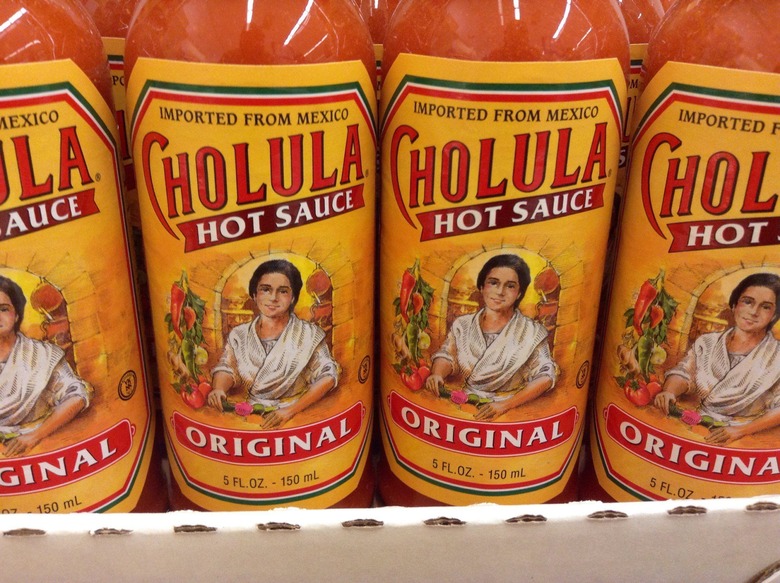Is Drowning Your Food In Hot Sauce Healthy?
For many of us, hot sauce is an, "Oh, I put it on everything!" type of condiment. While many of us are partial to particular brands (Cholula gang or eat rotten tomatoes), they mostly all have this in common: They contain almost no calories.
Click here to see The World's 11 Hottest Hot Sauces.
Many foods that are labeled as being free of calories aren't actually free of calories, of course. According to an FDA code of federal regulations on food labeling:
"The terms 'calorie free,' 'free of calories,' 'no calories,' 'zero calories,' 'without calories,' 'trivial source of calories,' 'negligible source of calories,' or 'dietarily insignificant source of calories' may be used on the label or in the labeling of foods, provided that... [the] food contains less than 5 calories per reference amount customarily consumed and per labeled serving [and it] meets this condition without the benefit of special processing, alteration, formulation, or reformulation to lower the caloric content."
In terms of calories, a food that's made from water, peppers, salt, and vinegar probably has a calorie content that's closer to five than zero per serving. But that's almost nothing. Calorically, slathering hot sauce over your breakfast, lunch, dinner, and any snacks you may have in between (you'll thank us for suggesting hot sauce on cottage cheese) won't kill your diet.
What about the heat and acidity? Everyone always claims that the inherent spiciness of hot sauce will boost your metabolism, but does it have any negative impact(s) on the body?
Jalapeño, cayenne, habanero, and tabasco peppers are common hot sauce ingredients. While they may not be the spiciest chile peppers on earth, they still include capsaicin. Capsaicin is the component of hot sauce that inspires a bit of a metabolism boost (it also has some antioxidant properties) when consumed in moderate quantities. A little bit certainly won't hurt you, but capsaicin is strong enough to be used in paint strippers and pepper spray. Other than painful mouth heat, this neurotoxin can inspire gastrointestinal issues, irritate mucous membranes, and promote inflammatory responses. When inhaled, capsaicin has been known to cause shallow breathing, coughing, and, in some extreme cases, death via asphyxiation. (Health tip: Don't inhale it.)
On the other hand, chiles are high in vitamin C, vitamin A, antioxidants, and flavinoids (which may have anti-inflammatory and anti-carcinogenic properties), and capsaicin itself can actually kill cancer cells, at least under laboratory conditions.
Calorically, then, hot sauce is in the clear — and it may well have other salutary effects. As long as you're not inhaling it or drinking gallons upon gallons of it daily, your body may benefit from using a little bit of the spicy stuff here and there.
The accompanying slideshow it provided by The Daily Meal's Dan Myers.
